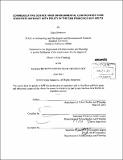Communicating science amid environmental controversy : how scientists interact with policy in the San Francisco Bay-Delta
Author(s)
Simmons, Erica (Erica Kathleen)
DownloadFull printable version (4.384Mb)
Alternative title
How scientists interact with policy in the San Francisco Bay-delta
Other Contributors
Massachusetts Institute of Technology. Department of Urban Studies and Planning.
Advisor
Judith Layzer.
Terms of use
Metadata
Show full item recordAbstract
In controversies over environmental management, participants often call for policies based on the best available science. However, environmental controversies are rarely simply disputes over scientific knowledge; instead, they are driven by stakeholders' conflicting interests and values. In this context, science often becomes a part of the political dispute, used and interpreted differently by different actors in the policy process. Scientists, therefore, face the challenge of communicating their research to non-scientific audiences-such as stakeholders, policy makers, and the general public-in a highly politicized context. This essay examines how scientists perceive their role in the policy process and how they navigate the intersection of science and policy in the San Francisco Bay-Delta, a region that has been the site of decades of scientific research and controversy over environmental management. This essay examines three cases: the CALFED Science Program, which built a policy-neutral body of research to support a collaborative planning process in the Bay-Delta that began in 2000; the interdisciplinary Bay- Delta policy reports which scientists from the University of California, Davis and the Public Policy Institute of California (PPIC) have published from 2007 to 2013 in reaction to policy failures; and a series of radio stories and interactive web maps that the San Francisco Estuary Institute (SFEI) produced in 2012 with KQED, a San-Francisco-based public media station, to communicate their research to a general California audience. These cases show how scientists in the Bay-Delta have struggled with the tension between communicating their research in a way that is salient to policy discussions and maintaining their legitimacy within scientific and policy communities. They also show an increasing political sophistication among scientists in the Bay- Delta as they have continued to engage in the policy process and an expanding scale of engagement, from working directly with the policy community to communicating about Bay- Delta ecology and policy with the general public. These approaches, while different, complement each other, demonstrating how scientists can communicate their research in a variety of ways depending on their relationship to the policy community.
Description
Thesis (M.C.P.)--Massachusetts Institute of Technology, Dept. of Urban Studies and Planning, 2013. Cataloged from PDF version of thesis. Includes bibliographical references (p. 59-63).
Date issued
2013Department
Massachusetts Institute of Technology. Department of Urban Studies and PlanningPublisher
Massachusetts Institute of Technology
Keywords
Urban Studies and Planning.